IoT in Telecom: How It's Impacting the Industry
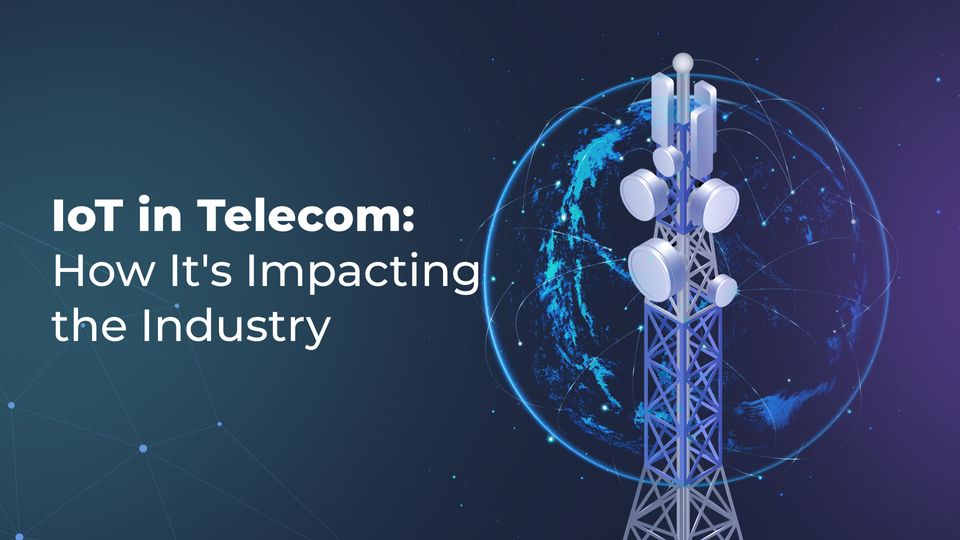
Technology is changing fast, and the Internet of Things (IoT) is a big part of it. It is used in smart homes, offices, self-driving cars, and even security systems. The impact of IoT is huge and will keep growing. Experts predict there will be more than 64 billion IoT devices worldwide by 2025.
Telecommunications companies, like Vodafone, AT&T or Verizon, are playing a crucial role in shaping the future of IoT. They offer their own advanced services and devices that can easily connect to the IoT networks. They use the so-called narrowband IoT networks to provide stable and affordable connections for all the connected devices.
At Flyaps, we've been working with telecom companies for over ten years, helping them improve their services and stay ahead of the game. In this article, we'll explain how telecoms can join the booming IoT trend and improve their offerings. We'll also share stories from some of the biggest companies in the industry, who have successfully embraced IoT to create a more connected world. Join us, as we are about to explore the possibilities of the future of IoT in the telecom industry.
What is IoT in the telecom industry
Just to be sure we’re on the same page, let’s recap what the IoT in telecom is exactly. In a nutshell, it's a concept that refers to a network of everyday physical objects or devices that are connected to the internet and can communicate with each other and with end-users. These objects can be anything, from your smartphone, smartwatch, or smart home devices like thermostats and lights, to larger things like smart cars and industrial machines. For example, you can turn on your home lights from your smartphone even when you're not at home or get notifications from your smartwatch about your health and fitness data.
To manage and control connected devices within an IoT network there are specific software platforms called IoT operating systems. These operating systems are paramount in the structure of IoT solutions, facilitating the interaction between devices as well as their engagement with cloud services. They provide the necessary protocols, security features, data management tools, and communication interfaces that allow devices to function as a part of the larger IoT ecosystem.
Telecom companies play a significant role in the IoT ecosystem. They provide the essential infrastructure and services necessary for IoT devices to connect to the internet and communicate with each other. For instance, telcos offer various communication protocols, such as cellular (3G, 4G, 5G), satellite, Wi-Fi, LPWAN (low power wide area network), and more for IoT devices to transmit data.
Since IoT creates lots of data, telecom companies help manage it. They store, process, and analyze the data so that businesses can make smart decisions based on the information. Telecom companies also take care of device management, billing, and subscriptions for IoT services.
But what’s more, telecom companies not only provide infrastructure for IoT to other businesses but also utilize this technology to improve their own internal processes and operations, like network monitoring, energy management, or customer experience.
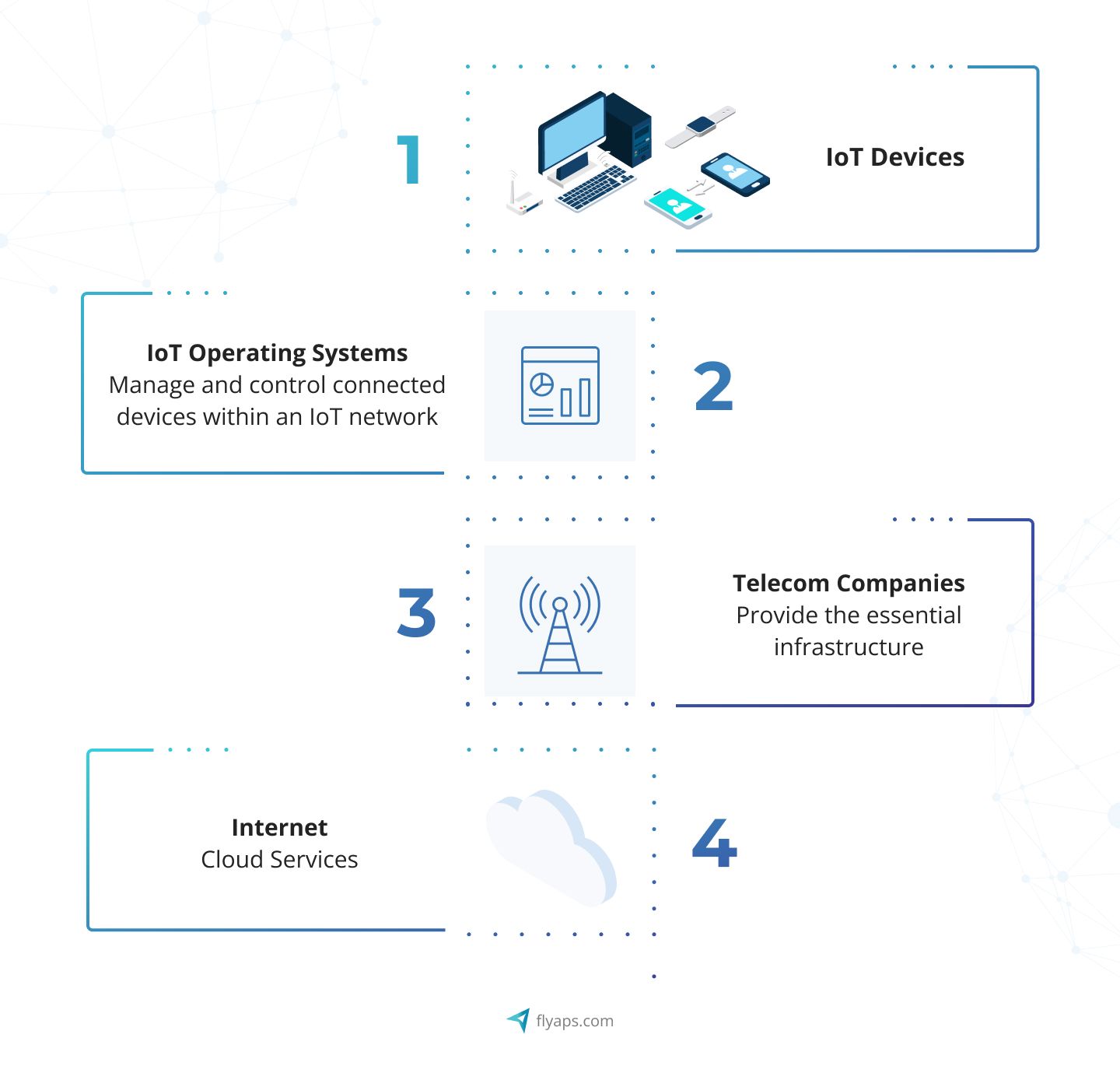
Now, you might be wondering if investing in IoT solutions for telecom is a good idea or if it's already too crowded. To figure that out, we need to understand the opportunities and challenges that come with IoT. Let's start by looking at the benefits of IoT in telecom.
The opportunities IoT brings to telecom
The market for IoT in telecom services is growing very fast. It was worth around $17.4 billion in 2021, and experts forecast it will reach $254.2 billion by 2031. This is because more and more people are using IoT technologies, especially after the pandemic.
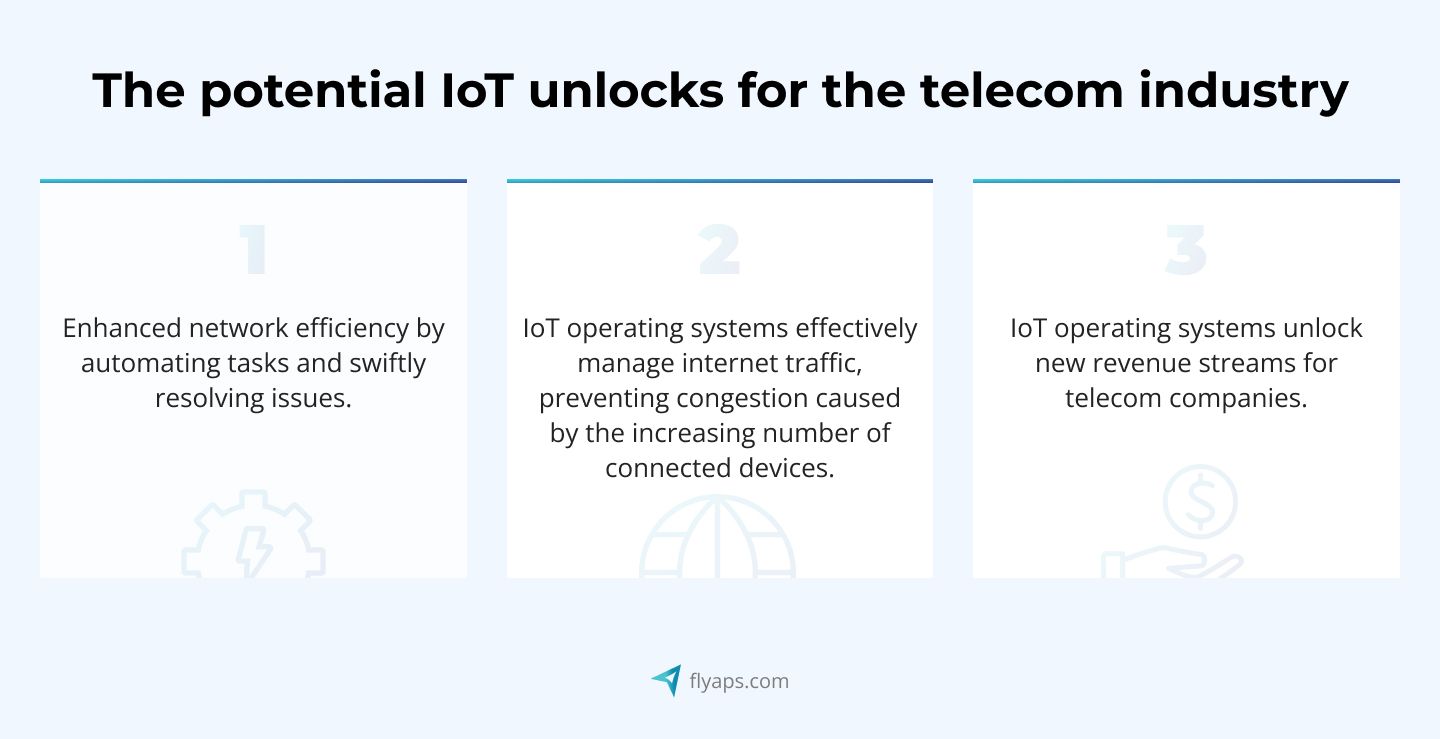
Let's look in more detail at how IoT tech changes the telecom industry for the better.
- Enhanced network efficiency by automating tasks and swiftly resolving issues.
This translates to improved customer service and reduced downtime, leading to higher customer satisfaction.
Imagine your telecom network as a busy highway. With IoT operating systems, it's like having smart traffic lights and automatic road repairs. This keeps the traffic flowing smoothly, reducing the number of jams and ensuring faster, more pleasant journeys for your customers. They'll love the improved service and fewer interruptions, which will make your telecom company stand out and attract more customers.
- IoT operating systems effectively manage internet traffic, preventing congestion caused by the increasing number of connected devices.
Picture a crowded highway where cars are stuck in traffic, causing delays and frustration. In the world of IoT in telecom, this traffic congestion is slow internet connections. But with IoT operating systems, the internet turns into a well-managed highway. These systems allocate bandwidth intelligently, making sure everyone gets a smooth online experience, just like a highway flowing smoothly! In other words, with IoT the internet works faster, ensuring a better user experience for everyone.
- IoT operating systems unlock new revenue streams for telecom companies.
That is basically what we’ve been saying earlier. Telcos are necessary for making the IoT ecosystem work and expand. There are a lot of innovative services like smart home solutions and connected car services telecom companies can generate substantial revenue from and achieve greater success.
Vodafone is a well-known IoT adopter, serving as an excellent example of how your telco can seize the opportunities IoT offers. Keep reading to gain a better understanding of how you can harness the potential of IoT for your telecom business!
IoT use cases in the telecom industry
Let's dive into real-life examples of how telcos are embracing IoT.
Vodafone: a key player in revolutionizing IoT-based services across industries
Vodafone is at the forefront of helping different industries upgrade their IoT-based services. A wide array of solutions relies on them, spanning from real-time monitoring in vehicles to fire and security surveillance. Even farmers benefit from Vodafone's expertise with projects like calving process monitoring. Let's take a closer look at some of the exciting projects where Vodafone plays a vital role.
Vodafone's IoT solution for smart metering in New Zealand

Vector Metering is a prominent supplier of intelligent metering solutions in New Zealand. They noticed that utility companies needed better ways to communicate with their customers' smart meters. The New Zealand government also encouraged the use of smart meters. So, Vector wanted a reliable and efficient solution to transmit metering data between the smart meters and a central data collection point.
To solve this challenge, Vector teamed up with Vodafone. Together, they came up with a special technical solution, where Vodafone's mobile network was used to transmit the metering data securely. Special billing module, included by Vodafone, created easy-to-read invoices for all the stakeholders involved.
As a result of this collaboration, Vector’s energy consumers could now enjoy innovative price plans that suited their specific needs and habits, which improved customer satisfaction.
Vodafone's IoT solution for connected healthcare at ASD Healthcare

ASD Healthcare is the largest distributor of specialty pharmaceutical products in the U.S. These medicines are irreplaceable for people with rare diseases. Therefore the company came up with Cubixx Solutions - an innovation that uses RFID tags on refrigerated units to monitor medication storage and usage in hospitals and pharmacies in real-time. This way, they ensure patients get access to life-saving medicines when they need them most.
But ASD Healthcare didn't stop there. ASD Healthcare wanted to expand their services worldwide, but it was a big challenge. Dealing with multiple suppliers, contracts and rates would have made things really complicated. They also needed a solution that would work in smaller practices and patients' homes, where local internet might not be stable. And that's where Vodafone IoT came in.
Vodafone offered a special platform called the Managed IoT Connectivity Platform that gave ASD Healthcare a single contract and reliable internet connectivity all over the world. This platform allowed the company to activate and keep track of all their SIM cards from one place, making things way more organized.
ASD Healthcare tried out the Vodafone connectivity on 100 Cubixx devices in different countries like the U.S., Brazil, and Canada. They kept testing and improving, adding new features based on feedback from patients. Smaller, home-based healthcare became really important, and patients loved the Cubixx devices more than the bigger ones.
Patients were thrilled with the idea of getting healthcare at home, and the smaller Cubixx devices were a hit. It's cheaper and less disruptive for patients, and it helps pharmaceutical companies reach more people by including them in clinical trials through Cubixx. Lastly, being able to monitor medication within one platform is super important for doctors and researchers too, so overall, it’s a clear win-win for everyone.
Reading about these successful IoT in telecom projects might lead to the false belief that there are only advantages awaiting businesses in this realm. However, given that IoT is still a relatively new concept, there are a few challenges telcos must be prepared for.
Challenges of IoT implementation for telecom
Several unavoidable challenges are associated with IoT in telecommunications. In particular, telcos must take care of data security, availability, compatibility and efficient data management. Let's delve into these intricacies further.
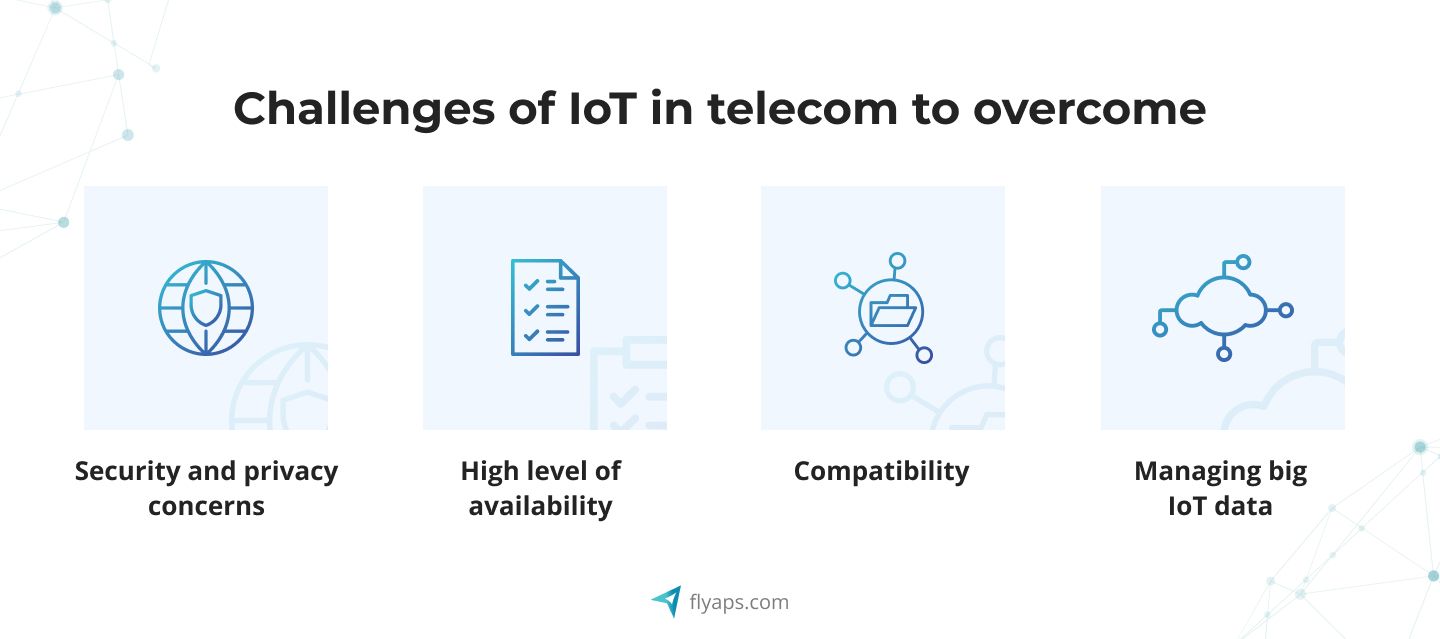
Security and privacy concerns: IoT devices store only a small amount of data locally, while the rest is saved on the cloud. Users worry about their personal data getting into the wrong hands, so telecom companies must protect their customers' privacy.
So, how can telcos address this challenge? First off, telecom companies should implement strong encryption techniques to secure the communication between IoT devices and the cloud. It's like putting a secret code on the messages sent between these two. Telcos should also enforce strict authentication mechanisms to verify the identity of IoT devices and users accessing the cloud. Think of it as checking IDs to make sure only trusted people can come in.
Keeping devices up to date is important, too. IoT devices that have the latest security patches and updates are less likely to be unsafe.
High level of availability: IoT is about getting information whenever you want it. But sometimes, things can go wrong, like applications not working. To fix this, IoT applications require regular updates and additional hardware and software components.
Imagine a company that uses IoT-connected sensors in their warehouses to track inventory levels. They rely on these sensors to know when to restock their products. However, sometimes the sensors malfunction, and the company might not get accurate data. To solve this, they can set up backup sensors that kick in when the main ones fail. It's like having extra workers on call to step in if someone is unable to work.
Compatibility: Some IoT devices don't work well together. It's like they don't understand each other's language.
Consider a smart city project where different municipal services use IoT devices to improve efficiency. However, these devices from various companies sometimes struggle to work together because they follow different communication standards. To solve this, the city authorities collaborate with these companies to create a common set of rules for their devices to follow. It's like making sure all the instruments in an orchestra play together harmoniously.
Managing big IoT data: IoT gathers lots of data from many devices. This creates a big problem because handling all that data without slowing things down is a big challenge for telcos.
To tackle the challenge telcos can start with data segmentation. It means dividing the massive amount of data into smaller, more manageable pieces. This way, the system doesn't get overwhelmed when it's processing data.
Another trick is investing in really strong storage solutions that can handle all this new data pouring in. This prevents slowdowns and ensures efficient data retrieval when needed.
By using predictive analytics, businesses can anticipate data spikes and allocate resources accordingly, preventing slowdowns during high-demand periods.
How Flyaps can help you to embrace the opportunities of IoT in telecom
At Flyaps, we've been working in the telecom industry for more than 10 years. During this time, we have made products that more than 100 telecom companies, including big ones like Orange Group, use on a daily basis. Thanks to our long experience in the field, we understand the problems and needs telecom companies have. That is why telecom giants choose us to revolutionize their IoT services with tailored solutions we built. Let’s see how we can help your telco:
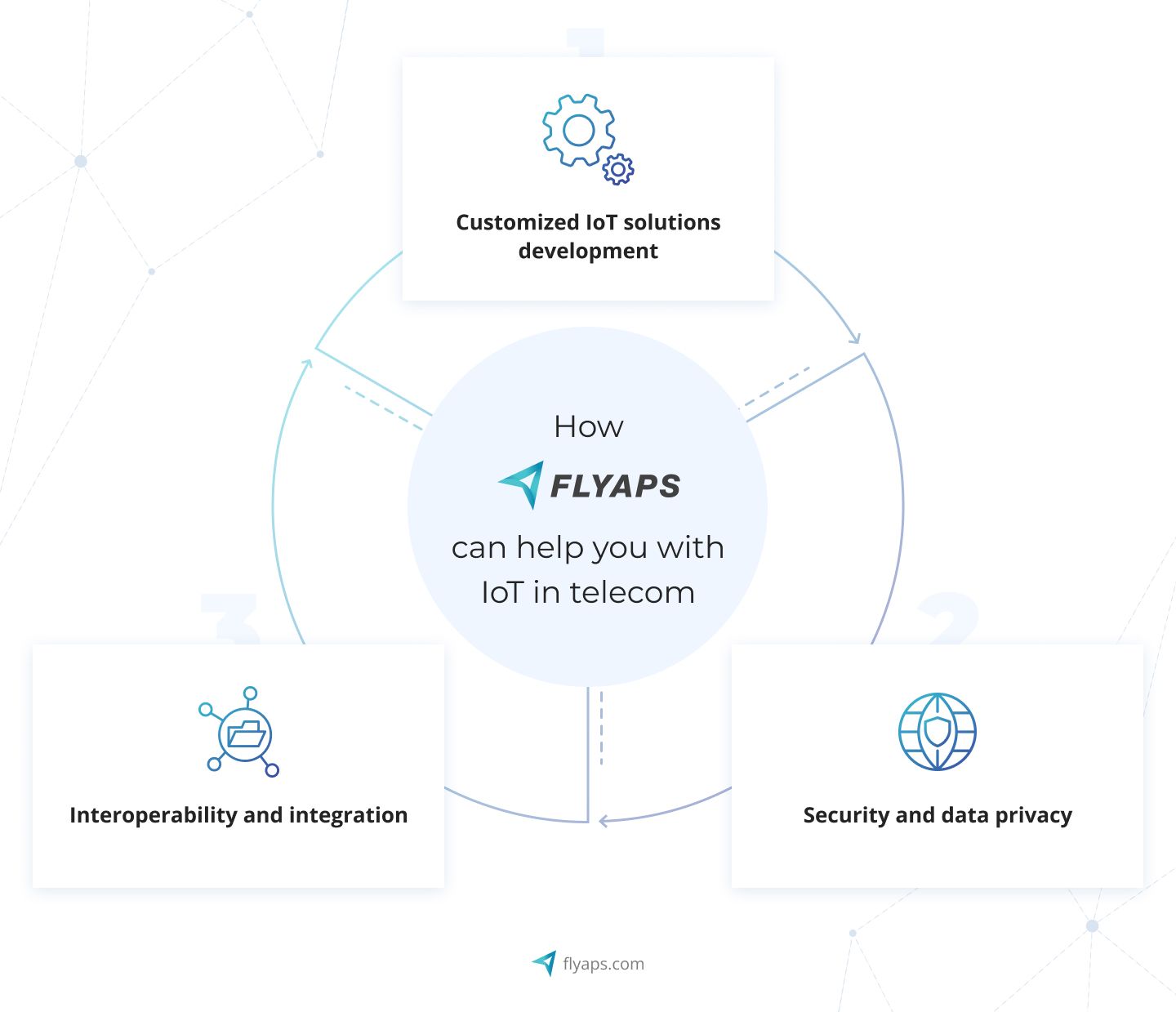
Customized IoT solutions development: We can create tailored IoT solutions to meet your specific needs and overcome the challenges you face. These solutions may include developing IoT platforms, applications, and data analytics tools designed to integrate seamlessly with your telecom infrastructure.
Security and data privacy: We can address your security concerns by implementing robust security protocols and encryption mechanisms to safeguard data. We can conduct regular security assessments and audits to identify and mitigate potential risks, ensuring that the IoT ecosystem remains secure and compliant with industry standards and regulations.
Interoperability and integration: We can develop middleware and APIs (Application Programming Interfaces) that facilitate communication between diverse IoT devices and systems.
Want to elevate your telecom operations with IoT or take your IoT services to new heights? Send us a message – we're looking forward to discussing the details!

